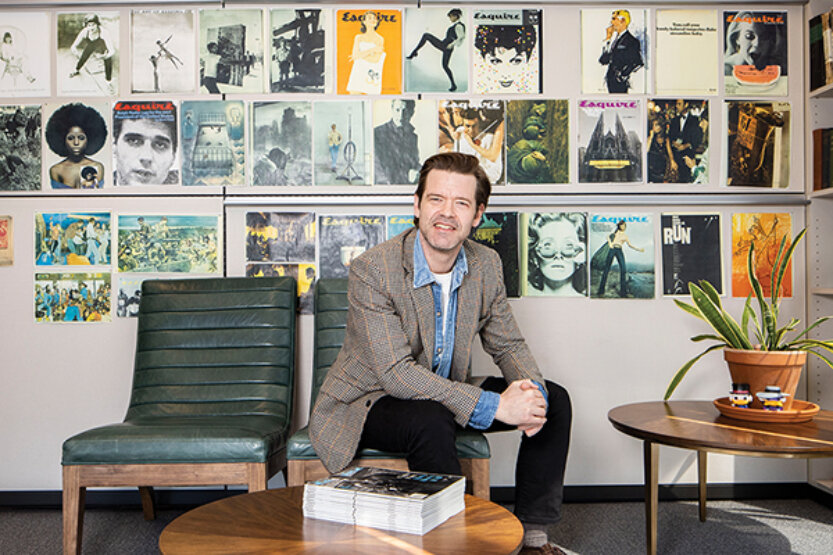Alumni Interview: Michael Sebastian
 “I want us to address everything that matters to a man in 2023,” says Sebastian, who became Esquire’s editor-in-chief in 2019. (Image by Katherine Marks)
“I want us to address everything that matters to a man in 2023,” says Sebastian, who became Esquire’s editor-in-chief in 2019. (Image by Katherine Marks) I’ve always been a magazine man. During the years I lived in the Sigma Chi frat house, I was one of the few who regularly read magazines. I subscribed to Esquire, GQ, Details and Rolling Stone. I’d take them to class and read them when the lectures got boring.
When I became editor-in-chief of Esquire in 2019, a lot of people thought I’d taken leave of my senses. Magazines are dead, people told me. Digital is killing the industry.
Everything I’ve learned since then tells me this isn’t so. It’s true that we publish only six print issues a year, and that for most of its history, Esquire was a monthly. But we have a website that publishes at least 10 new stories a day and gets 15 million visitors a month. We have a sizable presence on TikTok, YouTube, Instagram and Twitter; and we have long-running franchises and events, such as Best New Restaurants in America, Best Bars in America and Best New Hotels in America. We’re doing a lot. And even with all that, our writing continues to be best-in-class: We were nominated this year for another National Magazine Award, our industry’s Oscar.
This year, Esquire is celebrating its 90th anniversary. I’ve been spending a lot of time with the back issues, and it’s clear what a tremendous legacy the magazine possesses. Over the decades, we had built up enormous goodwill with our readers. It’s a kind of equity. But I felt we had started to draw down on that goodwill, and needed to reinvest.
A key part of my job is to set a tone. I want us to show respect for the classics, but at the same time celebrate the new, the emerging, the diverse. I don’t want to replicate what Esquire did during its “golden moments;” I want to bring the verve and intelligence those journalists possessed to this moment. I want us to address everything that matters to a man in 2023, and to do it with the great storytelling that Esquire is famous for.
“Magazines are dead, people told me.” —Michael Sebastian, ’03 LAS
When I started, I thought the magazine was a bit dusty, a bit too predictable in its interests. I want us to reinterpret who can be an Esquire man, to broaden the idea.
Last summer, for example, we put on our cover the actor Elliot Page, the most famous transgender man in the world. We wanted to say that the idea of what a man is has changed. The article got a lot of positive response but also generated a lot of negativity—death threats, even. The most gratifying response came from a reader in Texas, who said: “I’ve been reading Esquire all my life. I am so proud of my magazine. I know the world will catch up.”
I’m a suburban dad. I have to make Esquire not just about men like me. How do I stay in touch? It comes down to the people I surround myself with, the staff. I asked one young woman who was applying for a job which celebrities we should be profiling. She gave me a list of names, and I didn’t recognize any of them. They were all TikTok and YouTube influencers. She got the job.
During my college years, I didn’t aspire to be a journalist. I wanted to be a history teacher, but one professor suggested that I go out into the world for a year before immersing myself in academia. I took a job at a local newspaper and quickly fell in love with reporting. Covering town meetings and school-board elections teaches you what people find important. Getting a new traffic light is important. Saving a tree is important. Celebrity gossip is less important.
At one point, I landed what I thought was the scoop of the century. There was a mall being built, and I learned that the developer had defaulted on a loan. I got the information just as we were going to print—and I was wrong. The developer flew into town just to berate me at a town meeting. I had to take it because he was right. It was a character-building moment.
It’s a good time to work at a magazine for men. I like to say we’re rebranding masculinity. In the ’90s, traditional masculinity was being challenged everywhere, and magazines like Details and Maxim adopted a knee-jerk masculinity in response. They built a tree house and pulled up the ladder. We’re blowing up the tree house. We want to talk to everyone.

